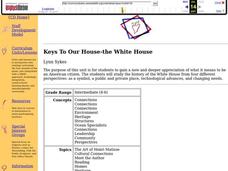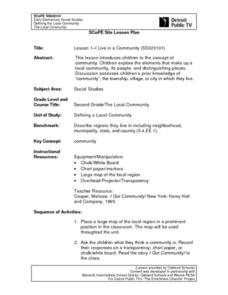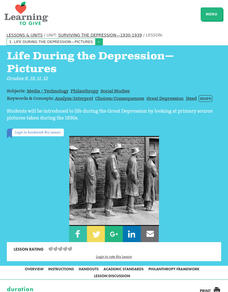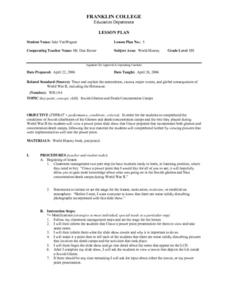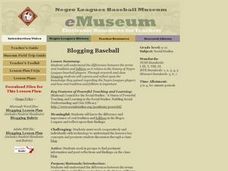Curated OER
Historical Fiction: Introducting Novels into History
Ninth graders read a novel for their foreign language class which is also used in their history class. In groups, they work together to complete stations and other assignments.
Curated OER
Adventures along the Oregon Trail in Nebraska
Pupils discover how the land and people we develop relationships with in Nebraska affect our survival--past, present, and future. They write about and interview their grandparents, parents and peers and compare them with people on the...
Curated OER
Keys To Our House-the White House
Young scholars explore the history of the White House from four different perspectives: as a symbol, a public and private place, technological advances, and changing needs. They take a virtual tour of the White House and explore its...
Curated OER
Toward Civilization
Students are asked to define the term civilization. They work in small groups, each group is given the option of researching either the Neanderthal civilization or that of ancient Egypt. Students apply their definition to two different...
Curated OER
Lesson 1-I Live in a Community
Second graders brainstorm the concept of a community and all the elements involved in the make up of one. They pull from the resources on the community that they already live in or have lived in. In addition, they share their reflections...
Curated OER
SEEKING FOREIGN ASSISTANCE
Learners discuss the events in recent Tibetan history that led
to their current government in exile and the four countries approached for help by Tibet and the response from each. They explain a position of agree or disagree with the...
Curated OER
Declaration of Independence
Eleventh graders interpret and analyze political cartoons. In this primary source analysis lesson, 11th graders examine the implications of Industrialization as they respond to questions regarding selected political cartoons about the...
Curated OER
Comparing Time Periods in U.S. History: The Ashford Project
Fifth graders use a "fact book" comparing periods in American history then students create a picture to illustrate their assigned periods. # # students use their pictures and concept maps to write expository paragraphs about their...
Curated OER
Family Life Around the Globe
First graders examine customs of other nations and compare countries using Venn diagrams. They also write pen pal letters and e-mails to students in other countries.
Curated OER
There Was Always Sun
Students investigate the chronicles of history about the Negro Leagues baseball by using rare historical footage and interviews with Black baseball greats. Students also examine how to work in groups to use online resources to reinforce...
Curated OER
Technology: Researching Inventions
Third graders, in groups, discuss their chosen invention and how it works. In preparation for a Powerpoint presentation, they research the inventor, the impact of the invention on society, and what llife would be like without it....
Curated OER
Hachimaki/Shibori Lesson Plan
Sixth graders are introduced to the technique of Arashi Shibori and its history. In groups, they discover how to perform this process and examine how to do hachimaki. To end the lesson, they make their own hachimaki to wear and share it...
Curated OER
Surviving the Depression- 1930-1939 Lesson 1: Life During the Depression- Picture
Students examine and analyze primary source documents and pictures from the Great Depression Era. They consider ways in which the suffering of the Era could have been alleviated.
Curated OER
Private See Dispute
Students use their definition of "reasonable expectations" of privacy with regard to camera cellphones and digital cameras, to draft recommendations to send to Congressional representatives.
Curated OER
Mills of New Hampshire
Students locate mill sites on a New Hampshire map. They describe who worked in the mills and their working conditions. They examine the environmental impact of the mills and work together to find out more information about mills.
Curated OER
Lesson 8: Early History of Illinois/Dual Timeline
Pupils, in groups, research and pretend as if they are interviewing a Mississippian child. They come up with three questions to ask to research their culture.
Curated OER
"Rivers of Change"
Third graders research the Los Angeles River Basin and how it has changed over time.
Curated OER
The United States Constitution
Twelfth graders research how the constitution was formed and the reasons for its implementation. They form a class wide constitution that expresses the steps originally used while forming the original constitution. Students vote and...
Curated OER
Jewish Ghettos and Death/Concentration Camps
Students trace and explain the antecedents, causes, major events, and global consequences of World War II, including the Holocaust. They assess the conditions of Jewish inhabitants of the Ghettos and death/concentration camps and the...
Curated OER
Blogging Baseball
Student identify differences between terms oral tradition and folklore as they relate to history of Negro Leagues baseball players, and research and post oral traditions and folklore findings on class blog.
Curated OER
Famous Marylanders
Fourth graders complete research on a famous person with ties to Maryland. They create web pages then publish and post these web pages on the school web site or another web site.
Curated OER
Learning to Use Map Legends
Fifth graders comprehend the purpose of and use map legends. They identify and use symbols and lines from legends on a general-purpose map and four topical maps to completely and accurately answer eight questions on a geography worksheet.
Curated OER
The Historical and Economic Impact of the Civilian Conservation Corps in South Carolina
Eighth graders explore the effects of the Civilian Conservation Corps. In this lesson, 8th graders use primary sources to examine how the CCC impacted North Carolina. Students will locate National Parks on a map, write a summary and...
Curated OER
America's Civil Rights Movement, Activity Four
Students investigate the concept that people died during the Civil Right;s Movement using the Matix method.




